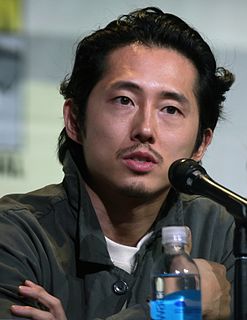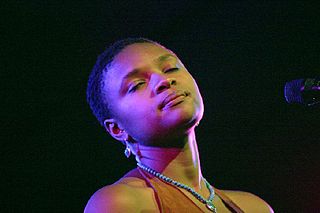A Quote by Winnie Holzman
I care about actors, and I understand them in a very personal way. I'm not saying every writer has to do that, but in my case, it's been helpful. I can put myself into the scene and think, 'What would it be like to act this?' Any writer who's really good probably does that to some extent.
Related Quotes
There's no drama. There's nothing. Everyone is there to work, everyone is really kind and everyone is very helpful, especially to me. I went in there, hoping to learn. I could have easily been put on some project with somebody who really doesn't care about teaching or sharing. But, while I was there, all of the cast were very helpful. I would constantly ask questions.
reading is not a passive act. It's a creative act. It's a relationship between the writer and a person the writer will probably never meet. I think it's very wrong to write in a way that leaves no room for the reader to maneuver. I don't want to get in the way. What I'd really like to do is to perform the Indian Rope Trick - go higher and higher and eventually disappear.
That's really the essence of what any fiction writer does. Some of it is research-based, but most of it is a really long-term, imaginative, empathetic effort to see the world the way someone whose experiences remote from yours might see it. Not every writer works that way; some writers make a wonderful career out of writing books that adhere very closely to how they view the world. The further I go with this, the more interested I get in trying to imagine my way into other perspectives that at first seem foreign to me.
Entertain, yes. That goes without saying. But a good writer does that automatically, it's built into the machine. Telling a thumpingly good, mesmerizing story is what one does without question. But beyond that, any writer worth his/her hire knows that all writing, one way or another, is subversive. It is guerrilla warfare against the status quo.
I'm in love with the way that Ella Fitzgerald delivered a lyric. She would deliver a lyric with the kind of clarity that would make you wonder why it was written, and make you think about the writer. I think every writer hopes an Ella of any genre or anytime gets a hold of their work and works the song like that.
There's this quote by a writer, Emil Cioran, he's a Romanian writer. He says that you should only put things in books that you would never dare to say to people in real life. So there is that feeling of acute embarrassment, or that you've been too revealing. I think it's some kind of survival mechanism where I never think of the reader, ever. Because then I would start censoring myself.
John Barth, I think, was really a writer of my own age and somewhat of my own temperament, although his books are very different from mine, and he has been a spokesman for the very ambitious, long, rather academic novel. But I don't think that what he is saying, so far as I understand it, is so very different from what I'm saying.
Sometimes people that are very good at improvisation in life, meaning like stage improvisation, aren't good in films because you have to ultimately take a scene where it needs to go. It's not about just saying something that's funny. You can say something funny but if it's not on story or driving the scene to its end it's really not very helpful at all.
I didn't know enough as a writer to understand why I needed to do this, but I understood in a very gut way that I could not entertain those thoughts of pleasing people and write this book - that it would be a very different book. Without really sort of investigating that instinct, which I'm glad for, I just made a conscious decision to put blinders on and not think about anything and put it all in. And I did. I put everything in. I had to look at the whole picture to see what I needed.






































